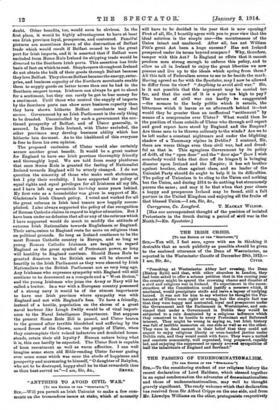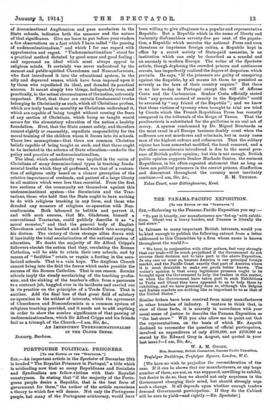THE PASSING OF UNDENOHINATIONALISM. [To TR. Moro: Or TAR . E1111DRATOL . 1
Srs,—To the considering student of our religious history the recent declaration of Lord Haldane, which *lamed together in an equal condemnation the advocates of denominationalism and those of nndenominationalism, may well be thought gravely significant. The ready welcome which that declaration has received from Sir Alfred Cripps on the one side, and from Mr. Llewelyn Williams on the other, protagonists respectively of denominational Anglicanism and pure secularism in the State schools, indicates both the measure and the nature of that significance. Give me leave to put before your readere a few observations on a fact which I have called "the passing of undenominationalism," and which I for one regard with apprehension and regret. "Undenominationalism " stood for a practical method dictated by good sense and good feeling and expressed an ideal which must always appeal to religious minds. It certainly was never understood by the earnest and public-spirited Churchmen and Nonconformists, who first introduced it into the educational system, in the silly and depraved senses, which have been imposed upon it by those who repudiated its ideal, and dreaded its practical success. It meant simply two things, indisputably true, and practically, in the actual circumstances of the nation, extremely important. First, that there are certain fundamental truths belonging to Christianity as snob, which all Christians profess, which are truly basal to morality as Christians understand it, which are capable of being taught without rousing the fears of any section of Christians, which being so taught would secure for the elementary education of the nation a healthy foundation. Next, that the State cannot safely, and therefore cannot rightly or reasonably, repudiate responsibility for the moral training of the children whom it forces into its schools. Those two assumptions—that there are common Christian beliefs capable of being taught as such, and that these ought to be included in the scheme of State education—underlie the policy and practice of tuadenominationalism.
The ideal, which undoubtedly was implicit in the union of Christians of many denominational types in teaching funda- mental truths which they all professed, was that of a restorii. tion of religious unity based on a clearer perception of the relative importance of credenda, and patient of a large liberty in all matters which were less than essentiaL From the first two sections of the community set themselves against this undenominational system—the Secularists and the Trac- tarians, those who held that the State ought to have nothing to do with religious teaching in any form, and those who dreaded any measure of religious co-operation with Non- conformists. Both laboured to belittle and pervert it, and with such success, that Mr. Gladstone, himself a conventional Tractarian, could publicly describe it as "a moral monster," and that the general body of English Churchmen could be hustled and hoodwinked into accepting his dictum. The victory of these strange allies draws with it inevitably the total secularization of the national system of education. No doubt the majority of Sir Alfred Grippe's followers cherish the notion that they, emulating the Roman Catholics, will be able to retain their own schools, and by means of " facilities " retain or regain a footing in the secu- larized schools. That is a vain hope. The Anglican Church cannot bring into the field the forces which make possible the success of the Roman Catholics. That is one reason. Secular schools imply the steady secularizing of the teaching profes- sion, and the sinking of the teacher's office from a pastorate to a contract job, haggled over in its incidents and carried out in its practice on the principles of a Trade Union. That is another. Add the final loss of that great field of salutary co-operation in the noblest of interests, which the agreement of Churchmen and Nonconformists in a common system of religious teaching provided, and it needs not to add anything in order to show the sombre significance of that passing of undenominationalism, which Sir Alfred Cripps and his friends hail as a triumph of the Church.—I am, Sir, &o., AN IMPENITENT UNDENOMENATIONALIST IN THE OLDER. SENSE.
Deanery, Durham,



















































 Previous page
Previous page